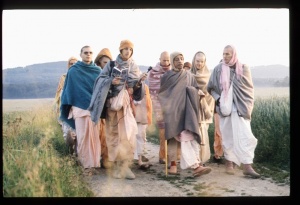SB 7.7.1: Difference between revisions
No edit summary |
(Vanibot #0054 edit - transform synonyms into clickable links, which search similar occurrences) |
||
| Line 24: | Line 24: | ||
<div class="synonyms"> | <div class="synonyms"> | ||
''śrī-nāradaḥ uvāca'' | ''[//vanipedia.org/wiki/Special:VaniSearch?s=śrī&tab=syno_o&ds=1 śrī]-[//vanipedia.org/wiki/Special:VaniSearch?s=nāradaḥ&tab=syno_o&ds=1 nāradaḥ] [//vanipedia.org/wiki/Special:VaniSearch?s=uvāca&tab=syno_o&ds=1 uvāca]'' — the great saint Nārada Muni said; ''[//vanipedia.org/wiki/Special:VaniSearch?s=evam&tab=syno_o&ds=1 evam]'' — thus; ''[//vanipedia.org/wiki/Special:VaniSearch?s=daitya&tab=syno_o&ds=1 daitya]-[//vanipedia.org/wiki/Special:VaniSearch?s=sutaiḥ&tab=syno_o&ds=1 sutaiḥ]'' — by the sons of the demons; ''[//vanipedia.org/wiki/Special:VaniSearch?s=pṛṣṭaḥ&tab=syno_o&ds=1 pṛṣṭaḥ]'' — being questioned; ''[//vanipedia.org/wiki/Special:VaniSearch?s=mahā&tab=syno_o&ds=1 mahā]-[//vanipedia.org/wiki/Special:VaniSearch?s=bhāgavataḥ&tab=syno_o&ds=1 bhāgavataḥ]'' — the exalted devotee of the Lord; ''[//vanipedia.org/wiki/Special:VaniSearch?s=asuraḥ&tab=syno_o&ds=1 asuraḥ]'' — born in a family of demons; ''[//vanipedia.org/wiki/Special:VaniSearch?s=uvāca&tab=syno_o&ds=1 uvāca]'' — spoke; ''[//vanipedia.org/wiki/Special:VaniSearch?s=tān&tab=syno_o&ds=1 tān]'' — unto them (the sons of the demons); ''[//vanipedia.org/wiki/Special:VaniSearch?s=smayamānaḥ&tab=syno_o&ds=1 smayamānaḥ]'' — smiling; ''[//vanipedia.org/wiki/Special:VaniSearch?s=smaran&tab=syno_o&ds=1 smaran]'' — remembering; ''[//vanipedia.org/wiki/Special:VaniSearch?s=mat&tab=syno_o&ds=1 mat]-[//vanipedia.org/wiki/Special:VaniSearch?s=anubhāṣitam&tab=syno_o&ds=1 anubhāṣitam]'' — what was spoken by me. | ||
</div> | </div> | ||
Latest revision as of 23:05, 18 February 2024

A.C. Bhaktivedanta Swami Prabhupada
TEXT 1
- śrī-nārada uvāca
- evaṁ daitya-sutaiḥ pṛṣṭo
- mahā-bhāgavato 'suraḥ
- uvāca tān smayamānaḥ
- smaran mad-anubhāṣitam
SYNONYMS
śrī-nāradaḥ uvāca — the great saint Nārada Muni said; evam — thus; daitya-sutaiḥ — by the sons of the demons; pṛṣṭaḥ — being questioned; mahā-bhāgavataḥ — the exalted devotee of the Lord; asuraḥ — born in a family of demons; uvāca — spoke; tān — unto them (the sons of the demons); smayamānaḥ — smiling; smaran — remembering; mat-anubhāṣitam — what was spoken by me.
TRANSLATION
Nārada Muni said: Although Prahlāda Mahārāja was born in a family of asuras, he was the greatest of all devotees. Having thus been questioned by his class friends, the sons of the asuras, he remembered the words spoken to him by me and replied to his friends as follows.
PURPORT
When he was in the womb of his mother, Prahlāda Mahārāja listened to the words of Nārada Muni. One cannot imagine how the baby in embryo could hear Nārada, but this is spiritual life; progress in spiritual life cannot be obstructed by any material condition. This is called ahaituky apratihatā. Reception of spiritual knowledge is never checked by any material condition. Thus Prahlāda Mahārāja, from his very childhood, spoke spiritual knowledge to his class friends, and certainly it was effective, although all of them were children.